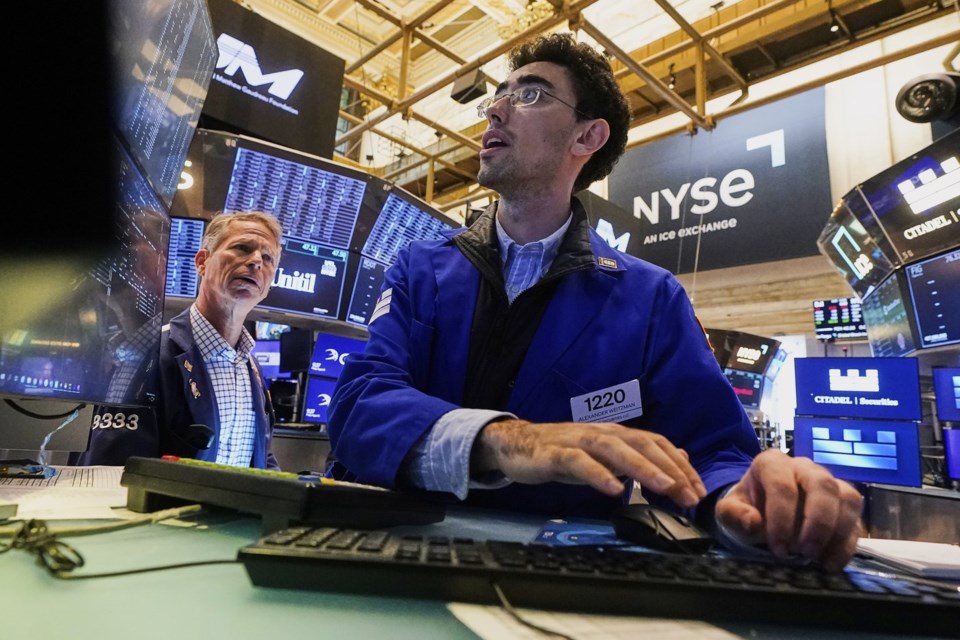NEW YORK (AP) — U.S. stocks edged back from their records, led by drops for technology companies, but Wall Street still closed out another winning week. The S&P 500 fell 0.3% Friday, slipping below the record it set a day earlier. The Dow Jones Industrial Average edged up 0.1%. The Nasdaq composite fell 0.4%. UnitedHealth Group jumped after Warren Buffett’s Berkshire Hathaway said it bought nearly 5 million shares of the insurer in the spring, while Applied Materials slumped on worries about its business in China. Treasury yields rose following mixed reports on the U.S. economy.
THIS IS A BREAKING NEWS UPDATE. AP’s earlier story follows below.
NEW YORK (AP) — U.S. stocks are edging back from record levels on Friday, led by drops for technology companies, but Wall Street is still heading toward the finish of another winning week.
The S&P 500 slipped 0.1% from the all-time high it set the day before, though it remains on track for its fourth winning week in the last five. The Dow Jones Industrial Average rose 124 points, or 0.3%, hovering around its own record, which was set in December. The Nasdaq composite was down 0.3%, as of 2:36 p.m. Eastern time.
The U.S. stock market set records this past week as expectations built that the Federal Reserve will deliver a cut to interest rates at its next meeting in September. Lower rates can boost investment prices and the economy by making it cheaper for U.S. households and businesses to borrow to buy houses, cars or equipment, but they also risk worsening inflation.
A disappointing report about inflation at the U.S. wholesale level on Thursday made traders pare back bets for coming cuts to interest rates, but they’re still overwhelmingly expecting them. Such anticipation has sent Treasury yields lower in the bond market, and they largely held there following a mixed set of updates on the economy on Friday.
One said shoppers boosted their spending at U.S. retailers last month, as economists expected, while another said that manufacturing in New York state unexpectedly grew. A third said industrial production across the country shrank last month, when economists were looking for modest growth.
Another report suggested sentiment among U.S. consumers is worsening because of worries about inflation, when economists expected to see a slight improvement.
“Overall, consumers are no longer bracing for the worst-case scenario for the economy feared in April,” when President Donald Trump announced his stunning set of worldwide tariffs, according to Joanne Hsu, director of the University of Michigan's surveys of consumers. “However, consumers continue to expect both inflation and unemployment to deteriorate in the future.”
On Wall Street, UnitedHealth Group jumped 13% after famed investor Warren Buffett’s Berkshire Hathaway said it bought nearly 5 million shares of the insurer during the spring, valued at $1.57 billion. Buffett is known for trying to buy good stocks at affordable prices, and UnitedHealth’s halved for the year by the end of July because of a run of struggles.
Berkshire Hathaway’s own stock slipped 0.3%.
Applied Materials helped lead Wall Street lower with a drop of 13.9% even though it reported better results for the latest quarter than analysts expected. The focus was on the company’s forecast for a drop in revenue during the current quarter.
Its products help manufacture semiconductors and advanced displays, and CEO Gary Dickerson pointed to a “dynamic macroeconomic and policy environment, which is creating increased uncertainty and lower visibility in the near term, including for our China business.”
Sandisk fell 4.6% despite reporting a profit for the latest quarter that blew past analysts’ expectations. Investors focused instead on the data storage company’s forecast for profit in the current quarter, which came up short of Wall Street’s.
In stock markets abroad, indexes rose 0.8% in Shanghai but fell 1% in Hong Kong after data showed China’s economy may have slowed in July under pressure from uncertainty surrounding Trump’s tariffs.
“Chinese economic activity slowed across the board in July, with retail sales, fixed asset investment, and value added of industry growth all reaching the lowest levels of the year. After a strong start, several months of cooling momentum suggest that the economy may need further policy support,” ING Economics said in a market commentary.
Japan’s Nikkei 225 jumped 1.7% after the government said its economy grew at a better-than-expected pace in the latest quarter.
European stock indexes were mixed ahead of a meeting later in the day between Trump and Russian President Vladimir Putin, which could dictate where the war in Ukraine is heading.
In the bond market, the yield on the 10-year Treasury rose to 4.33% from 4.29% late Thursday. The two-year Treasury yield, which more closely tracks expectations for Fed action, rose to 3.76% from 3.74% late Thursday.
___
AP Writer Teresa Cerojano contributed.
Stan Choe, The Associated Press



